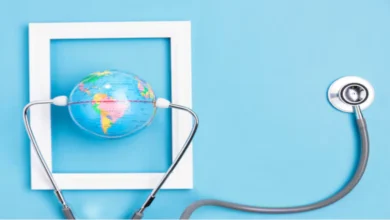Health Without Medicine: Embracing Natural Methods for a Better Life

Achieving Health Without Medicine: A Holistic Approach
Maintaining good health is something everyone aspires to, but in today’s fast-paced world, we often turn to medicine as the quickest fix for ailments. However, there are numerous natural and holistic approaches that can help improve and sustain your health without relying on medications. In this article, we will explore how to achieve “health without medicine,” focusing on lifestyle changes, natural remedies, and daily habits that promote overall well-being.
The Importance of Health Without Medicine
Health isn’t just about treating illness when it arises, but about creating a foundation that supports your body in functioning optimally. Health without medicine means taking proactive steps to ensure that your body is in balance, reducing the need for pharmaceutical intervention.
By focusing on diet, exercise, mental well-being, and natural healing methods, you can prevent diseases and maintain vitality without the long-term dependence on drugs. Let’s explore how simple lifestyle changes can help improve your health and give you the vitality you need.
The Role of Nutrition in Achieving Health Without Medicine
Clean Eating: A Key to Health Without Medicine
One of the most powerful ways to improve your health is by eating nutrient-dense foods. Clean eating involves consuming whole, unprocessed foods that nourish your body with essential vitamins, minerals, and antioxidants.
Keywords: clean eating, whole foods, balanced diet, nutrient-dense foods
- Fruits and Vegetables: High in fiber, antioxidants, and essential vitamins, fruits and vegetables are the foundation of a healthy diet.
- Healthy Fats: Sources of omega-3 fatty acids, such as avocados, nuts, and seeds, help maintain brain function and reduce inflammation.
- Whole Grains: Whole grains like brown rice, quinoa, and oats provide complex carbohydrates that support sustained energy levels.
By avoiding processed foods, sugars, and refined grains, you can significantly reduce the risk of chronic diseases such as diabetes, heart disease, and obesity.
Hydration: Essential for Health Without Medicine
Water is essential for every cell and organ in your body. It helps in digestion, detoxification, and maintaining healthy skin. Many of us overlook the importance of drinking enough water, which can lead to fatigue, headaches, and other health issues.
Keywords: hydration, water intake, detoxification, health benefits of water
To stay properly hydrated, aim for at least 8-10 glasses of water a day. Herbal teas and fresh fruit juices can also contribute to your daily water intake. Make it a habit to drink water first thing in the morning to kickstart your metabolism and keep your body functioning optimally throughout the day.
Physical Activity: A Natural Way to Boost Health
Exercise Without Medicine: The Power of Movement
Physical activity is one of the best ways to maintain health without medicine. Regular exercise helps regulate your body weight, strengthen muscles and bones, improve cardiovascular health, and boost mental clarity. Whether it’s walking, running, yoga, or strength training, staying active is crucial for long-term well-being.
Keywords: physical activity, regular exercise, yoga, cardiovascular health, strength training
- Walking: A simple and accessible form of exercise that promotes heart health and improves circulation.
- Yoga: Known for its ability to reduce stress, improve flexibility, and strengthen the body, yoga is an excellent choice for holistic health.
- Strength Training: Building muscle mass through weight lifting or resistance exercises helps increase metabolism and improve bone health.
Aim to engage in at least 30 minutes of moderate exercise most days of the week to reap the full benefits of movement.
Stress Management: How Mental Health Plays a Role in Health Without Medicine
Mindfulness and Meditation for Stress Relief
Stress is often referred to as the “silent killer” because it can lead to numerous health problems, including high blood pressure, heart disease, and even depression. Managing stress is essential for maintaining good health without medicine. Mindfulness and meditation are two practices that can help you manage stress and improve your emotional well-being.
Keywords: mindfulness, meditation, stress management, emotional well-being
- Meditation: Practicing meditation for just 10-15 minutes a day can help reduce anxiety, enhance focus, and calm your mind.
- Breathing Exercises: Techniques such as deep breathing and box breathing activate the parasympathetic nervous system, which helps reduce stress and promote relaxation.
By incorporating mindfulness into your daily routine, you can improve your mental clarity, emotional balance, and overall health.
Sleep: The Foundation of Health Without Medicine
Good quality sleep is essential for overall health. Poor sleep can lead to a variety of health issues, including weakened immunity, weight gain, and increased stress. Sleep gives your body the time it needs to repair itself and restore energy levels.
Keywords: sleep, quality sleep, good sleep hygiene, immune function
To improve sleep quality:
- Stick to a regular sleep schedule.
- Avoid caffeine and electronic devices before bed.
- Create a relaxing bedtime routine, such as reading or taking a warm bath.
Getting 7-9 hours of quality sleep every night can help keep you feeling refreshed, mentally sharp, and physically healthy.
Natural Remedies for Common Ailments
Herbal Remedies: Nature’s Medicine Cabinet
For minor health concerns, herbal remedies can be a great alternative to pharmaceutical treatments. Many herbs have been used for centuries for their healing properties. Here are a few examples of how you can use herbs to promote health without medicine:
Keywords: herbal remedies, natural medicine, healing herbs, alternative health
- Ginger: Known for its anti-inflammatory properties, ginger can help reduce nausea and soothe digestive issues.
- Turmeric: Contains curcumin, a compound with powerful anti-inflammatory effects. It is often used to reduce pain and inflammation, especially in conditions like arthritis.
- Peppermint: Used for its ability to relieve headaches, digestive discomfort, and muscle pain.
Before using herbal remedies, it’s important to consult with a healthcare provider, especially if you’re taking other medications, as herbs can interact with certain drugs.
Essential Oils: Aromatherapy for Health Without Medicine
Aromatherapy involves the use of essential oils to promote physical and emotional health. Essential oils are often used in diffusers, during massages, or in baths to reduce stress, improve mood, and even help with pain relief.
Keywords: essential oils, aromatherapy, pain relief, mood enhancement
- Lavender Oil: Known for its calming and relaxing properties, lavender oil can help reduce anxiety and promote better sleep.
- Eucalyptus Oil: Helps clear congestion and can alleviate symptoms of respiratory issues.
- Peppermint Oil: Provides relief from headaches and muscle tension.
Incorporating essential oils into your wellness routine can help you maintain a balanced and healthy lifestyle without relying on traditional medicine.
Building a Healthier Lifestyle for Long-Term Wellness
Developing Healthy Habits
Maintaining health without medicine isn’t just about adopting a few isolated habits—it’s about creating a sustainable lifestyle that nurtures your mind, body, and soul. Developing healthy habits will ensure that you continue to feel your best and reduce your risk of chronic diseases.
Keywords: healthy habits, lifestyle changes, sustainable wellness, overall health
Some habits to consider:
- Eat a balanced diet rich in whole foods and healthy fats.
- Stay active by engaging in regular physical exercise.
- Prioritize mental well-being by practicing mindfulness, meditation, and stress management techniques.
- Get sufficient sleep to allow your body to rejuvenate.
Preventative Care: Health Without Medicine Through Proactive Measures
Instead of waiting for illness to strike, preventative care focuses on maintaining health before it’s compromised. Regular check-ups, maintaining a healthy weight, and avoiding harmful behaviors like smoking and excessive alcohol consumption are all important steps toward a healthier, longer life.
Keywords: preventative care, health maintenance, wellness check-ups, healthy lifestyle
Small, everyday changes can help prevent illness and maintain vitality well into old age. Remember, health is not just the absence of disease, but the presence of balance and harmony in all aspects of life.
Conclusion: Embrace Health Without Medicine
Achieving health without medicine is about taking responsibility for your own well-being by adopting habits and practices that support your body, mind, and spirit. By focusing on a balanced diet, regular physical activity, mental health practices, and natural remedies, you can improve your quality of life and reduce the need for pharmaceuticals.
Start making small changes today, and you’ll soon notice a significant improvement in your overall health. A holistic approach to wellness not only helps you feel better now, but it sets the foundation for a longer, healthier life—without the need for medicine.
Frequently Asked Questions (FAQs)
What are some effective ways to improve health naturally without relying on medication?
Improving health naturally involves making conscious lifestyle changes, such as eating a nutrient-dense diet, staying hydrated, practicing regular physical activity, and managing stress. Incorporating natural remedies like herbal teas, essential oils, and meditation can also support overall well-being. Focus on a balanced routine that nurtures both the body and mind to avoid relying on pharmaceutical treatments.
Can I stay healthy without taking any medicine if I have a chronic condition?
While chronic conditions require medical attention, many individuals with chronic illnesses can benefit from integrating lifestyle changes to improve their health. A balanced diet, regular physical activity, stress management, and natural remedies may support symptom management. Always consult your healthcare provider before making any changes to your treatment plan, but these practices can complement your existing medical care.
Is it possible to prevent illnesses without using traditional medicine?
Yes, it is possible to reduce the risk of many illnesses through preventive measures such as proper nutrition, exercise, and stress management. Maintaining a healthy weight, getting enough sleep, and practicing good hygiene can significantly reduce your chances of developing chronic diseases. While medicine plays a crucial role in treating specific conditions, these lifestyle changes can lower your overall health risks.
What are some natural remedies I can use to relieve common health issues?
Natural remedies can be very effective for treating mild ailments. For instance:
- Ginger is known for easing nausea and reducing inflammation.
- Peppermint oil can help with digestive discomfort and headaches.
- Turmeric has anti-inflammatory properties that may benefit those with joint pain. Incorporating these natural remedies into your routine can help manage minor health issues without relying on pharmaceutical products.
How does mindfulness and meditation contribute to better health?
Mindfulness and meditation are essential for mental well-being. They help reduce stress, anxiety, and depression, all of which can negatively impact physical health. By calming the mind and promoting relaxation, meditation encourages better sleep, boosts immune function, and enhances cognitive clarity. Integrating mindfulness practices into your daily routine can significantly improve your overall quality of life.
What role does exercise play in staying healthy without medicine?
Exercise is a powerful tool for maintaining health without medicine. Regular physical activity helps improve cardiovascular health, build muscle strength, enhance flexibility, and manage weight. It also has positive effects on mental health, reducing symptoms of anxiety and depression. Whether it’s walking, yoga, or strength training, regular movement supports both physical and emotional well-being, reducing the need for pharmaceutical interventions.
READ ALSO: Discovering Clarinda, Iowa: A Hidden Gem in the Heart of the Midwest





